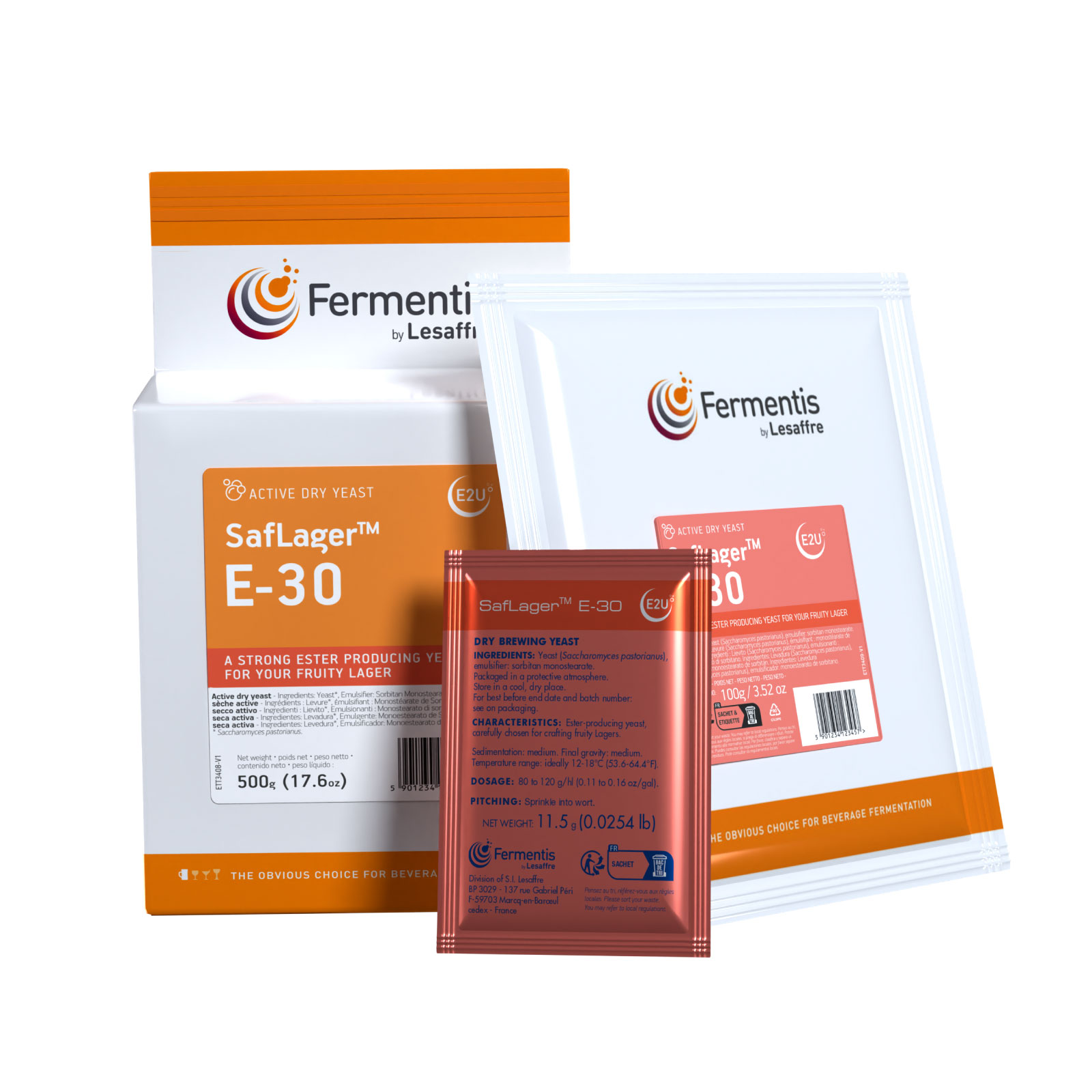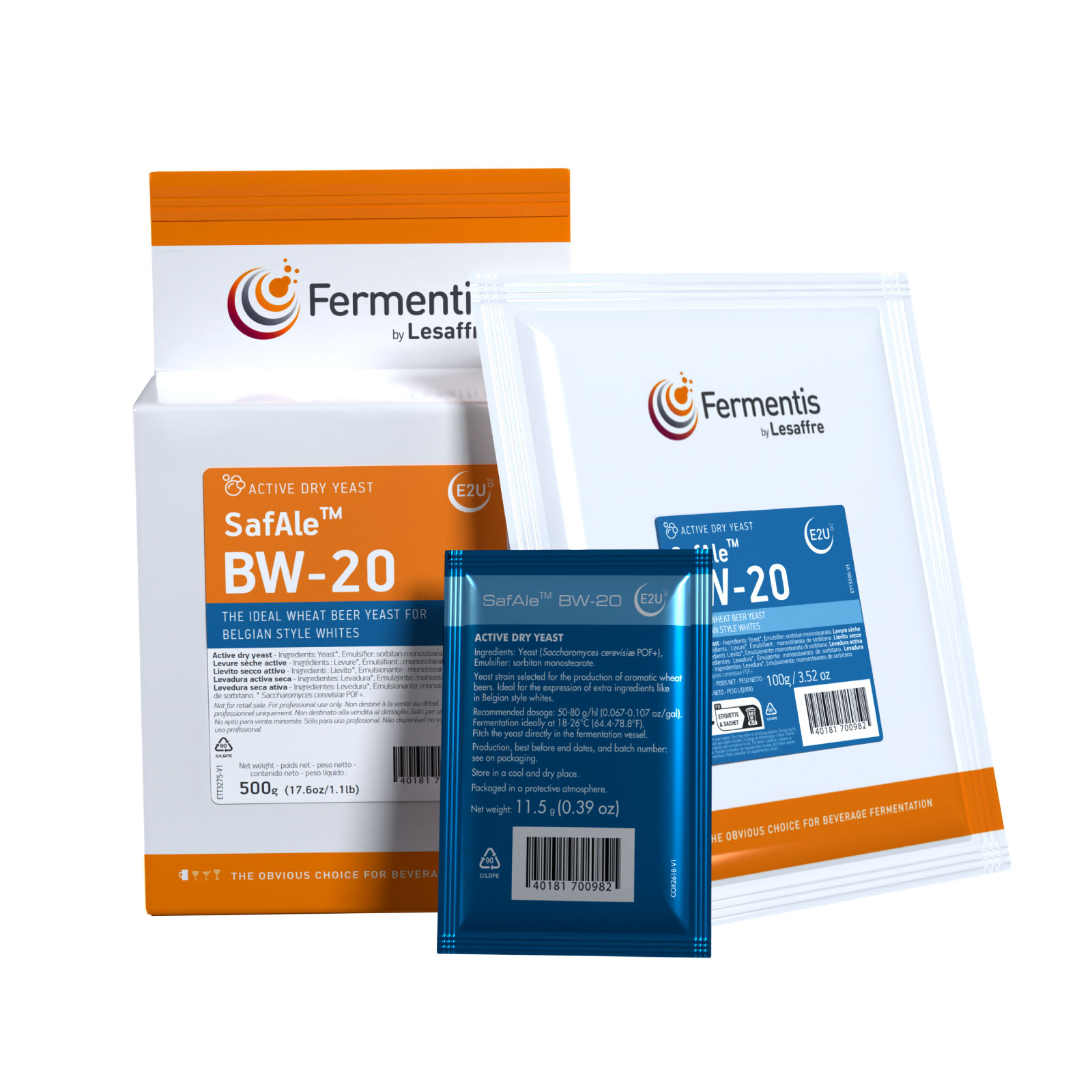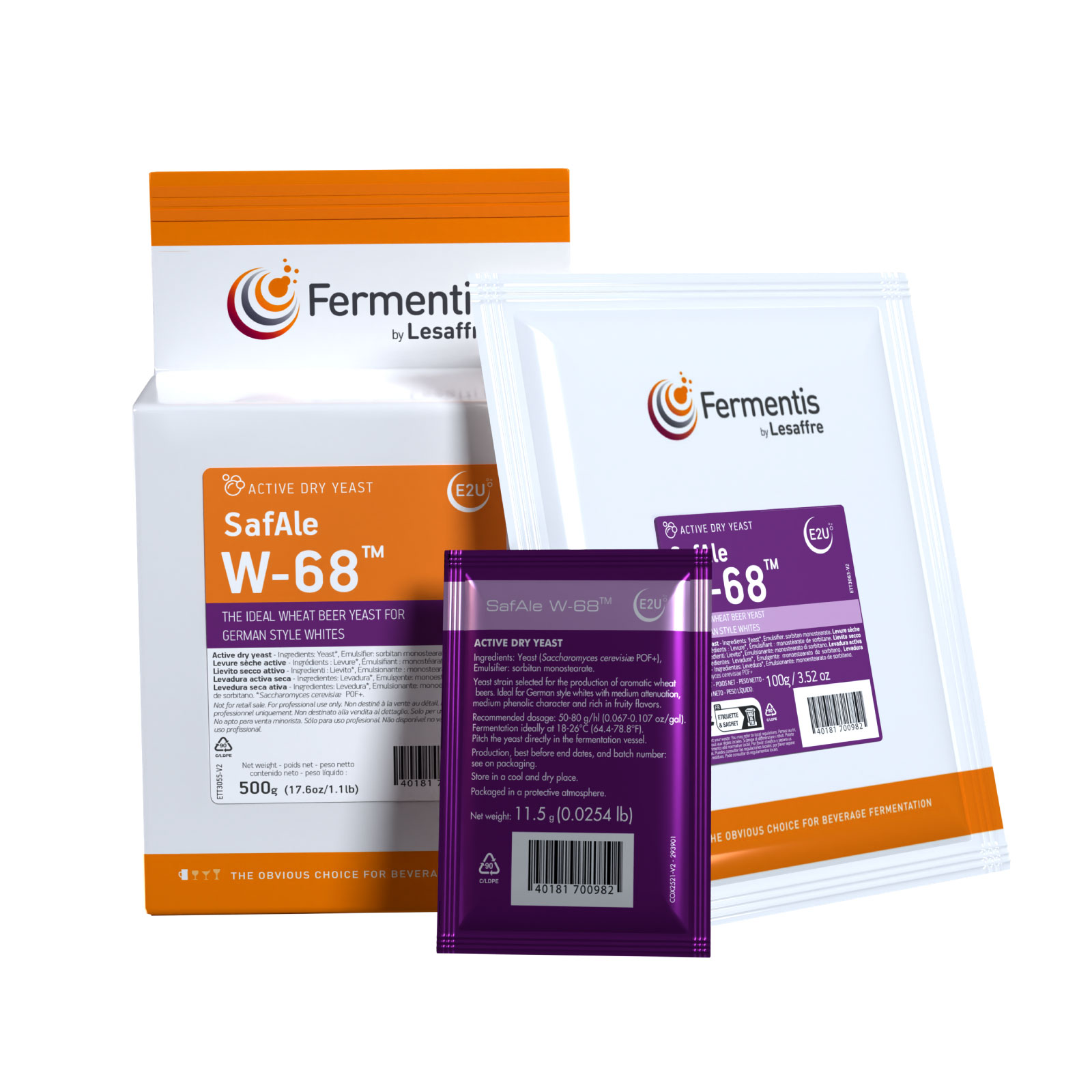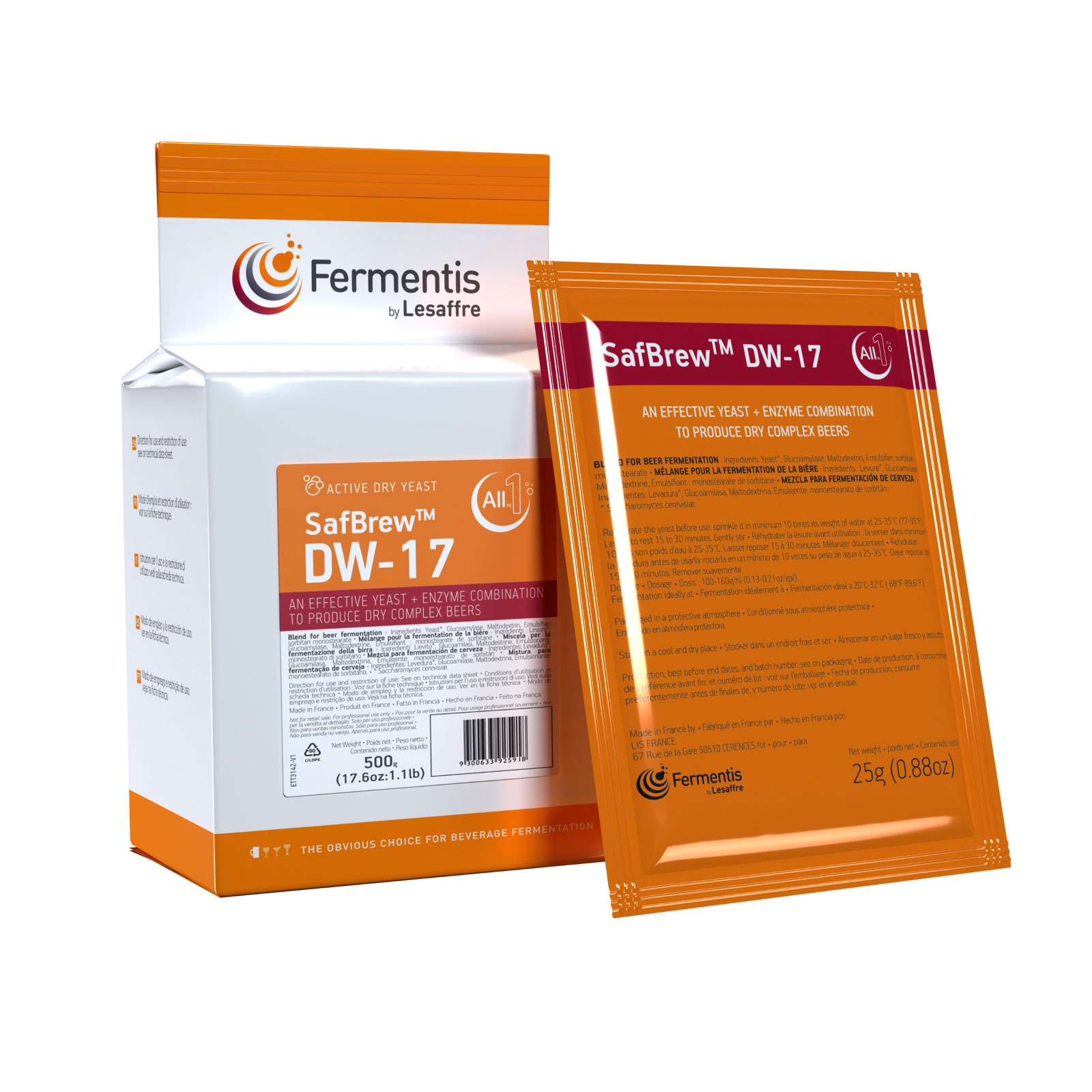PARA VINOS ESPUMANTES FRESCOS, LIMPIOS Y CON PERFIL MINERAL
SafŒno™ SPK 05 ha sido seleccionada por el Departamento de Investigación y Desarrollo de Fermentis por su capacidad para soportar condiciones de fermentación difíciles y contribuir positivamente al carácter aromático del vino. SafŒno™ SPK 05 es especialmente adecuada para la producción de vinos espumantes frescos, limpios y de perfil mineral.
Dosificación: Vinos blancos tranquilos: 20 g/hl (1,67 lb/1000 gal); prise de mousse: protocolo específico suministrado bajo pedido.
Ingredientes: Levadura (Saccharomyces cerevisiae*), Emulsionante: Monoestearato de sorbitán (E/INS 491)
*Según "Revisiting the taxonomic synonyms and populations of Saccharomyces cerevisiae – Phylogeny, Phenotypes, Ecology and Domestication." Pontes A., Hutzler M., Brito P.H. y Sampaio J.P., 2020 y "Genome Diversity and Evolution in the Budding Yeasts (Saccharomycotina). Genetics." Dujon B.A., Louis E.J., 2017 ; 206(2):717-750.
Características sensoriales de la SafŒno™ SPK 05
<br data-source="\Para vinos base blancos de primera calidad destinados a la producción de vinos espumantes limpios y minerales: <br data-source="Gracias a su excelente capacidad fermentativa, SafOEno™ SPK 05 permite la producción de vinos blancos con perfiles limpios, frescos y minerales. SafOEno™ SPK 05 se considera una fermentadora limpia con una robusta cinética de fermentación en un amplio rango de temperaturas y con baja demanda de nitrógeno.
Para " Prise de mousse " para todo tipo de vinos espumantes (Champagne, Prosecco, Crémants…). Para la fermentación secundaria (prise de mousse), SafOEno™ SPK 05 muestra una cinética rápida y regular incluso a bajas temperaturas (14 °C/57,2 °F) y permite producir rápidamente vinos espumantes elegantes, frescos y limpios.<br data-source="\Gracias a sus excepcionales cualidades técnicas, SafOEno™ SPK 05 se recomienda tanto para la fermentación primaria como para prise de mousse.\r\n\r\n"/
o País: Italia.
o Variedad de uva: Grillo.
o Añada: 2020.
Características químicas del vino tras la fermentación alcohólica:
– TAV: 10,68% v/v,
– pH: 3,06,
– acidez total: 7,51 g/L H2 SO4,
– acidez volátil: 0,27 g/L H2 SO4,
– ácido málico: 2 g/L.
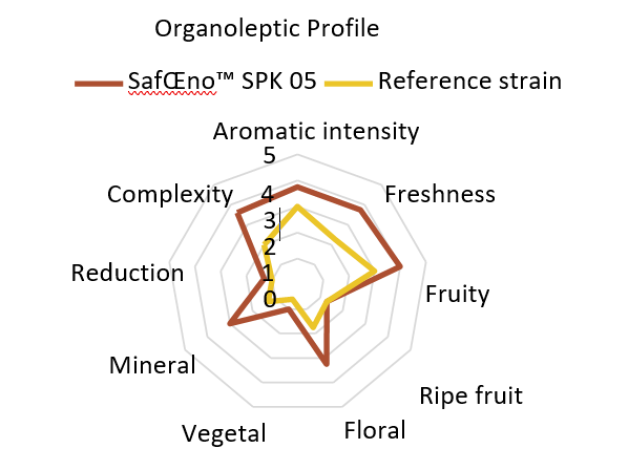
SafŒno™ SPK 05 permitió obtener un vino blanco (tipo vino base – bajo pH y bajo alcohol) con un perfil aromático equilibrado con notas frescas, florales y minerales. Los catadores prefirieron este vino por su calidad general, frescura y perfil limpio.
SafŒno™ SPK 05
Capacidad fermentativa:
– Buena capacidad de implantación
– Fase de latencia de duración media
– Cinética fermentativa rápida y regular (primera fermentación y prise de mousse)
– Tolerancia máxima al etanol: hasta 15% v/v.
– Rango recomendado de temperatura de fermentación 10-30 °C (50-86 °F)
– Gran capacidad de fermentación en condiciones estresantes; bajo pH (2,8-2,9) y bajas temperaturas.
– Bajos requerimientos de nitrógeno: Relación NFA (mg/l)/azúcares (g/l) = 0,7-0,8
Características metabólicas:
– Baja producción de acidez volátil
– Consumo medio de ácido málico (20% de la concentración inicial)
• Alta resistencia al SO2 (entre 50 y 75 mg/L)
• Producción muy baja de acetaldehído, SO2 y H2S
El know-how de Lesaffre y la mejora continua de los procesos de producción generan una calidad excepcional de levaduras secas capaces de resistir diferentes condiciones de preparación del inóculo, incluidas la aclimatación, rehidratación en frío o inoculación sin rehidratación previa, sin afectar su viabilidad, cinética y/o perfil analítico. Los productores de vino pueden elegir utilizar nuestra levadura E2U™ con el proceso que mejor se adapte a sus necesidades:
- Inoculación directa: Inocular la cantidad deseada de levadura directamente en el tanque de fermentación sobre la superficie del mosto y homogeneizar todo el volumen. En vinos blancos o rosados, lo ideal es espolvorear la levadura directamente en el tanque de fermentación durante el llenado (después de la sedimentación) para garantizar una correcta homogeneización. Alternativamente, se puede verter la cantidad deseada de levadura sobre la superficie de un volumen de mosto equivalente a 10 veces el peso de la propia levadura. Mezclar suavemente para evitar la formación de grumos. Transferir inmediatamente al tanque de fermentación y homogeneizar todo el volumen.
- Con rehidratación previa y aclimatación opcional: verter suavemente la cantidad deseada de levadura en un volumen de agua de grifo equivalente a 10 veces el peso de la propia levadura a una temperatura de entre 15 y 37 °C (59 a 98,6 °F). Mezclar suavemente para evitar la formación de grumos. Dejar reposar 20 minutos e incorporar el inóculo al tanque de fermentación homogeneizando todo el volumen. Opcionalmente, tras la rehidratación, es posible continuar con una aclimatación incorporando al inóculo ½ volumen de mosto y dejándolo reposar durante 10 minutos. Repetir la operación hasta que la diferencia de temperatura entre el tanque de fermentación y el inóculo sea inferior a los 10 °C (50 °F).
Embalaje
- Caja de cartón con 20 paquetes de 500 g/1,1 lb cada uno envasados al vacío (peso neto de la caja completa: 10 kg).
- Caja de cartón con un paquete de 10 kg/22,05 lb envasado al vacío (peso neto de la caja completa: 10 kg).
Garantía
El producto debe almacenarse/transportarse en condiciones secas y protegido de la luz solar directa. Por un período menor a los 6 meses, el producto puede almacenarse/transportarse a temperatura ambiente, inferior a 25 °C (77 °F), sin que ello afecte su performance. Se permiten picos de hasta 40°C durante un periodo de tiempo limitado (menos de 5 días). Fermentis recomienda un almacenamiento a largo plazo a temperatura controlada (inferior a 15°C/59°F), una vez que el producto llega a su destino final. Fermentis garantiza que el producto cumple las especificaciones de la OIV hasta su fecha de caducidad en las condiciones de almacenamiento mencionadas anteriormente. El producto también está autorizado por el TTB.
Cada levadura Fermentis se desarrolla según un esquema de producción específico y se beneficia de los conocimientos técnicos del grupo Lesaffre, líder mundial en la fabricación de levaduras. Esto garantiza la máxima pureza microbiológica y la máxima actividad de fermentación.
La información proporcionada por Fermentis tiene fines informativos y está dirigida únicamente a profesionales. No hacemos ninguna declaración ni garantía de ningún tipo, expresa o implícita, con respecto a la información: los requisitos reglamentarios y de propiedad intelectual (incluido el uso y las afirmaciones sobre el producto) deberán ser revisados localmente para sus fines particulares.











